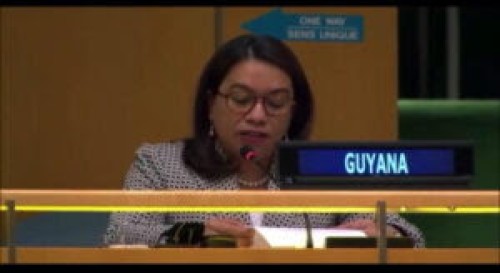UNITED NATIONS – Guyana’s Permanent Representative to the United nations, Carolyn Rodrigues- Birkett, has reiterated her country’s commitment to a peaceful solution to the border dispute with Venezuela, which is claiming the Essequibo region in the Caribbean Community (CARICOM) country.
 Guyana’s Permanent Representative to the United nations, Carolyn Rodrigues- Birkett (File Photo)The UN Security Council met in private on Tuesday to discuss the recent developments regarding the territorial dispute between the two countries at the request of Guyana’s President, President Irfaan Ali in an April 5 letter he had submitted to the Council.
Guyana’s Permanent Representative to the United nations, Carolyn Rodrigues- Birkett (File Photo)The UN Security Council met in private on Tuesday to discuss the recent developments regarding the territorial dispute between the two countries at the request of Guyana’s President, President Irfaan Ali in an April 5 letter he had submitted to the Council.
The meeting was held under the theme “Threats to international peace and security” with the Assistant Secretary-General for Europe, Central Asia and the Americas Miroslav Jenča providing a brief to the Council.
Rodrigues- Birkett in her presentation to the Council provided a thorough overview of the history of the border controversy, and highlighted the actions that have been taken by Venezuela in contravention of diplomatic agreements, including the Argyle Declaration, and international law, including the legally binding orders of the International Court of Justice.
She emphasized Guyana’s commitment to peace, the rule of law and to the resolution of the controversy through the International Court of Justice (ICJ).
Ambassador Rodrigues-Birkett underscored the Council’s responsibility to ensure respect for the rule of law and adherence to the fundamental principles of the UN Charter.
She called on the Council to impress on Venezuela the need to pursue a peaceful settlement of the controversy by the ICJ, as it is bound to do by the 1966 Geneva Agreement.
Venezuela’s Ambassador to the United Nations, Samuel Moncada Acosta, who was present at the session, ruled out any occupation plan by the South American country.
No official statement has so far been issued by the UN Security Council following the meeting at which both Haiti and Suriname addressed the delegates.
But in a statement posted on ‘X’ formerly Twitter, the United Kingdom said “Venezuela cannot act unilaterally to disrupt the peace of the region.
“The border was settled in 1899 through international arbitration and must be respected,” the UK said.
The Security Council said Guyana had requested the meeting citing Article 35 (1) of the UN Charter, which states that any UN member state “may bring any dispute, or any situation referred to in Article 34 [that is, one that may lead to international friction or give rise to a dispute] to the attention of the Security Council or of the General Assembly”.
In the letter requesting the meeting, Ali cited the “Organic Law for the Defense of Guayana Esequiba”, which President Nicolas Maduro signed on April 3.
Ali warned that this action “cements Venezuela’s intent to annex more than two-thirds of Guyana’s sovereign territory and make it part of Venezuela”.
But Maduro described the law as the implementation of the results of the December 3, 2023 referendum, adding that the law “establishes the creation of state number 24, the state of Guayana Esequiba within the political and territorial organization of the Bolivarian Republic of Venezuela”.
The law also reiterated Venezuela’s rejection of the validity of the 1899 Paris Arbitral Award and the ICJ’s jurisdiction on the matter.
In his April 5 letter, President Ali said that the law violates the International Criminal Court’s (ICJ) December 1, 2023 provisional measures and expressed concern that given Caracas’ disregard of this order, “Venezuela’s next move would be to implement its plan for the seizure of our sovereign territory”
Ali added that such an act would be a breach of the fundamental principles of international law enshrined in the UN Charter and would contradict the letter and spirit of the Argyle Declaration.
The letter also rejects recent claims made by Maduro that the US has installed bases of the Central Intelligence Agency (CIA) in Essequibo, calling it a “dangerous narrative”.
The dispute over the Essequibo region, approximately 160,000 square km stretch of densely forested land that constitutes two-thirds of Guyana’s territory and is home to roughly 125,000 of its 800,000 citizens, stretches back to the 19th century, when Guyana was under colonial rule.
Venezuela has laid claim to the Essequibo region since 1841, when it argued that the British Empire had encroached on Venezuelan territory in its acquisition of the territory of then-British Guiana from the Netherlands. It has also challenged the validity of the 1899 Paris Arbitral Award through which the border between Venezuela and British Guiana was decided.


